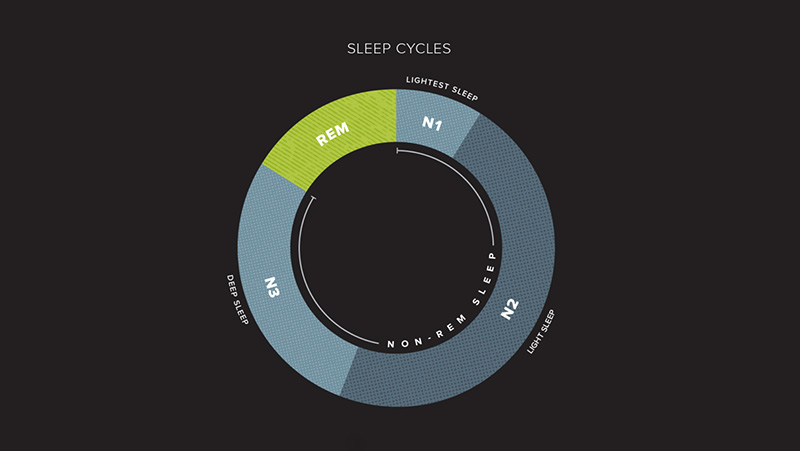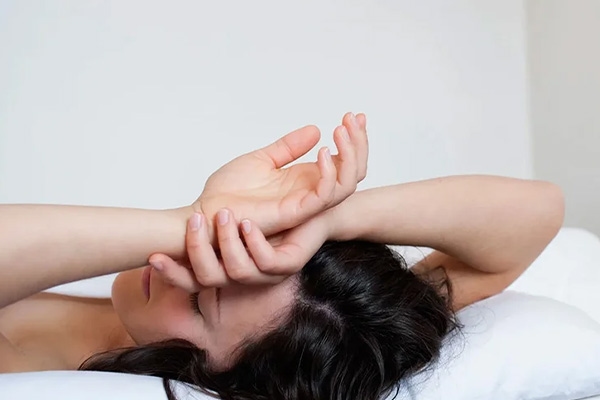Have you ever woke up in the morning feeling all tired even after a full night's sleep? It's like you didn't sleep at all, and your body wants more naps. If this situation sounds familiar, it might be a sign that you're not getting enough of that important REM (rapid eye movement) sleep. So, how do we make sure we're getting enough of this sleep?
What is a REM Sleep?
REM is a kind of sleep where you dream and your brain does important things simultaneously. Scientists found out about it in the 1950s when they observed babies' eyes moving quickly while they were still asleep. That's why they call it Rapid Eye Movement or REM.
When you're in REM, your brain stem, gets really active, taking care of basic activities like your heartbeat and breath. It then sends audiovisuals to the cortex, which is in charge of learning and thinking. This is why REM is connected to dealing with emotions and memories. When you dream, it helps you figure out and understand what’s happening.
During REM, your body stops your muscles from moving so that you don't come into motion while you are dreaming. This keeps you numb while your brain is busy in this active sleep time.
Signs of REM
During this sleep, your brain and body experience a few changes. Here are some signs showing you're in the REM stage of sleep:
- Changes in body temperature
- High blood pressure
- Rapid heart rate
- Brain activity increases
- The brain uses more oxygen
- Breathing becomes fast and irregular
- Eyes move quickly in different directions (rapid eye movements)
- Some people may experience sexual arousal
- Twitching of the body, especially in the face, arms, and legs
Most people also go through a temporary paralysis called atonia during a REM. It means the muscles that usually block body movements come into action, causing short-term paralysis.
Tips on Getting More REM

Getting more sleep is equal to improving your overall health and sleep quality. Here are some tips that you can follow to get more high-quality REM:
Optimize Sleep Duration
REM usually takes place within 90 minutes after falling asleep, with the first stage lasting about 10 minutes. Simultaneously the REM period lasts longer, with the final one lasting for about an hour. Adults normally have 3-5 REM cycles per night, whereas you need about 4-6 full cycles to feel refreshed.
The American Academy of Sleep Medicine and the Sleep Research Society recommend at least 7 hours of sleep per night for adults. However, infants may require at least 17 hours of sleep a day for maximum development.
Create a Consistent Sleep Schedule
It's important to have a consistent sleep schedule where you go to bed and wake up at the same time daily, even on weekends. This helps your body understand when to get ready for sleep and when to gear up for the day. This consistency helps regulate your sleep-wake cycle.
Reduce Alcohol Intake
Alcohol intake, especially before going to bed, can suppress your sleep during the first half of the night. While you may feel sleepy initially after the consumption of liquor, it may interrupt the normal sleep cycle, causing you to wake up more often during the night and disturb the actual quality of sleep.
Avoid Nicotine
Nicotine is something that messes with your brain and keeps you away from feeling sleepy at night. It also changes the way you sleep, reducing the quality and quantity of your sleep. Therefore, if you are a smoker, try avoiding it at least before going to bed.
Regulate Blood Sugar Levels
Your blood sugar levels can mess with your REM. Keeping an eye on your blood sugar and eating a balanced diet can be really helpful. If your blood sugar gets too low, it might release stress hormones causing bad dreams. On the other hand, if it's too high, it can again mess up your sleep, making it hard for you to fall asleep and even raising the chances of sleep apnea.
Limit Your Screen Time
It's important to avoid any screen, whether it's a TV, laptop, or even your phone, before bedtime. These screens give off blue light that messes with your body's internal sleep cycle by stopping your body from forming melatonin, a sleepy hormone. When melatonin is low, it's difficult to sleep well.
Stress Management
Feeling stressed or anxious affects your sleep, messes up your routine, and makes you wake up a lot. Managing stress is super important. Things like reading, writing, meditating, or doing yoga before bed can help calm your mind and improve your sleep quality.
Significance of Rapid Eye Movement Sleep
Understanding the importance of your sleeping can help you with your overall health and well-being. Here are a few signs of getting the best night’s sleep (REM).
- Boosting memory
- Enhances your Creativity
- Balances mood
- Recharge your body
Risk of Not Getting Enough REM
Getting insufficient REM can harm your physical, mental, and emotional health. Here are a few signs that you might be lacking the sleep your body needs:
- Trouble with remembering things.
- Mood swings and emotional breakdowns.
- Anxiety and depression.
- It can affect your immune system.
- Weight gain or Obesity.
Bottom Line

At last remember, REM is super important for good health and mind. It even helps to boost your mood and immune system. So, try to take full advantage of these pro tips!
Remember, if you're still having trouble, it's better to talk to a doctor.
Sources
Welltory: How to Get More REM Sleep? 8 Science-Baked Tips
Healthline: 8 Tips for How to Get More REM Sleep
Sleep Foundation: REM Sleep Revealed: Enhance Your Sleep Quality












